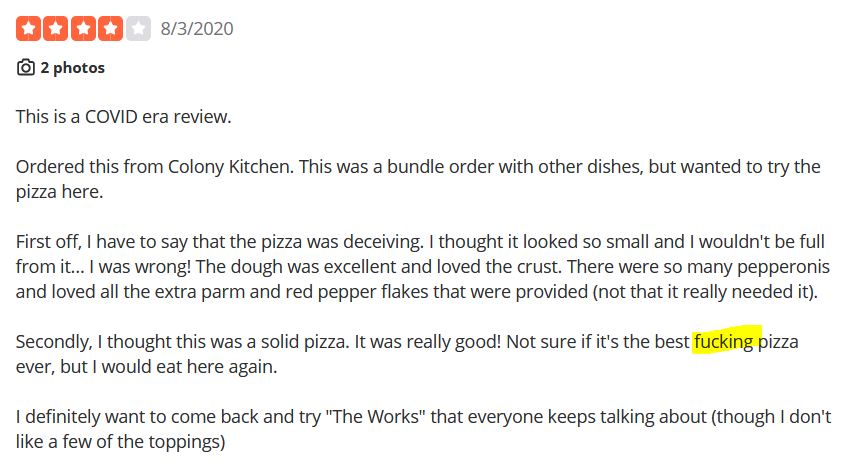Customer satisfaction (or dissatisfaction) is the source of word-of-mouth. But does the person receiving the message believe it? A 2022 research sheds light on electronic word-of-mouth and, more specifically, on customer reviews left on websites like Yelp and Amazon. The research shows that using vulgar terms in customer reviews increases their perceived usefulness and, therefore, their effectiveness. In this article, we decode this article for you and provide you with an easy summary.
If you only have 30 seconds
- The presence of vulgar words in customer reviews correlates with those reviews’ perceived value.
- Even when censored, vulgarity retains its effect on the perceived value.
- Vulgar words are interpreted as a sign of the authenticity of the customer review.
- On Yelp, 8.9% of customer reviews contain at least one vulgar word.
- On Amazon, 3.5% of customer reviews contain at least one vulgar word.
- In some product categories, more than 50% of customer reviews are questionable.
- E-commerce companies should not ban customer reviews containing vulgar words. They can, however, censor them by replacing the letters with asterisks. This will not affect their perceived value of the customer review.
Summary
- A few reminders about customer satisfaction and word-of-mouth
- Customer reviews: a wealth of information
- Vulgarity is found in customer reviews in different forms
- What is the effect of vulgarity in customer reviews?
- What conclusions can you draw for the management of your customer reviews?
A few reminders about customer satisfaction and word-of-mouth
Before getting to the heart of the matter, we think it is useful to recall how customer satisfaction and word-of-mouth are linked.
Word-of-mouth, like customer loyalty, stems from customer satisfaction. In other words, when a customer is satisfied, he talks about it around him and remains loyal to the company that provided him with the product/service. It’s a little schematic, but in the main lines, it’s true.
If the correlation between customer satisfaction and loyalty/word-of-mouth was strong 10 years ago, it is less so today. This is due to online purchasing habits and the high “volatility” of consumers. However, there are a few nuances to be considered.
Customer reviews: a wealth of information
Since 2010, customer reviews have become the preferred source for studying the phenomenon of electronic word-of-mouth. Moreover, customer reviews have become a market, with companies proposing to simplify their management or verify their authenticity. The importance of customer reviews in the purchase decision is proven: 93% of online buyers say that customer reviews influence their purchase decision. Unsurprisingly, achieving positive customer review objectives is an operational marketing issue for many companies.
More than 50% of customer reviews are questionable in some product categories.
Authenticity is the most threatening aspect of customer reviews. Companies have specialized in selling fake customer reviews. The proportion of fake customer reviews is far from being anecdotal. A Washington Post survey shows that over 50% of customer reviews are questionable in some product categories. This percentage even reaches 67% for testosterone boosters.
We can find vulgarity in customer reviews in different forms
Vulgarity is rarely present in customer reviews because the terms of use mostly ban it. Most platforms ban the use of vulgar words and hunt for them. Yelp is an exception. The use of vulgar words is allowed. However, they remain rare. Here are 2 examples from restaurant reviews. You will see 2 different forms of vulgarity:
- the word in its literal form (“fucking”)
- the word in its self-censored form (“f******”)
There is a 3rd form. This is called the “euphemistic” version. It uses a perfectly normal word that is phonetically close to its vulgar counterpart. To continue the example above, the euphemistic version of “fuck” could be “frick.”

What is the effect of vulgarity in customer reviews?
Let’s get to the results of the research. What is the effect of using vulgar words in a customer review?
Anyone who is considering buying something online must form an opinion about:
- the product itself
- the person who wrote the customer review
The opinion is formed from the available text
To form his opinion, the customer will use what is available online: the product description and customer reviews. We will therefore interpret a customer review subconsciously to infer the product’s qualities and the trust placed in the person who wrote the review. Since many customer reviews are false, the consumer looks for elements that prove the reality of what he reads.
Vulgar customer reviews are seen as more useful
This is the main finding of this research, and it is surprising. Customer reviews containing one or more vulgar words are judged as more “useful.” All platforms now propose to consumers to identify the customer reviews they consider more or less useful (see screenshot below). Thanks to this vote, the authors demonstrated that customer reviews containing at least one vulgar word are more useful. This is a statistical correlation between 100,000 customer reviews from Yelp.com and 200,000 from Amazon. Like my research on Linkedin’s algorithm, we cannot dispute this conclusion, but we still need to understand the underlying mechanisms.
Even when censored, vulgar words have an impact
The first interesting result of this research is that, even when censored, the vulgar words contained in a customer review remain “effective.” Consumers consider them as useful as customer reviews that contain uncensored vulgar words. The same is not true for “euphemisms.” These do not have the desired effect.
The effect of the number of vulgar words in the customer review
The number of vulgar words used in a customer review alters the type of inference the consumer makes. The research compared the effect of reviews containing 2 and 5 vulgar words. With 2 vulgar words, the consumer focuses on the product itself, with 5 on the person who wrote the review. This is called a moderating effect.

What conclusions can you draw for the management of your customer reviews?
This research has 2 immediate implications for customer review management:
- Don’t censor vulgarity. Vulgarity (up to a point, no doubt) is useful. It is interpreted as a way to make the customer review more authentic.
- If the vulgarity is intolerable to you, it is possible to replace the last letters of the vulgar term(s) with asterisks. The perceived value of the customer review will not be affected.
Posted in Research.




